
ISSN: 2321-9653; IC Value: 45.98; SJ Impact Factor: 7.538 Volume 10 Issue XII Dec 2022- Available at www.ijraset.com



ISSN: 2321-9653; IC Value: 45.98; SJ Impact Factor: 7.538 Volume 10 Issue XII Dec 2022- Available at www.ijraset.com

Nisha Sawant1, Shubham Naik2
1Department of Computer Applications and IT, Goa Multi-Faculty College, Dharbandora, Goa 2Business Administration Department, Goa Multi-Faculty College, Dharbandora, Goa
Abstract: Corporate social responsibility (CSR) is a type of international private business self-regulation that aims to contribute to societal goals of a philanthropic, activist, or charitable nature by engaging in or supporting volunteering or ethically-oriented practices. While once it was possible to describe CSR as an internal organisational policy or a corporateethic strategy, that time has passed as various international laws have been developed and various organisations have used their authority to push it beyond individual or even industry-wide initiatives. While it has been considered a form of corporate self-regulation for some time, over the last decade or so it has moved considerably from voluntary decisions at the level of individual organizations to mandatory schemes at regional, national, and international levels. Considered at the organisational level, CSR is generally understood as a strategic initiative that contributes to a brand's reputation. As such, social responsibility initiatives must coherently align with and be integrated into a business model to be successful. With some models, a firm's implementation of CSR goes beyond compliance with regulatory requirementsand engages in "actions that appear to further some social good, beyond the interests of the firm and that which is required by law”. Furthermore, businesses may engage in CSR for strategic or ethical purposes. From a strategic perspective, CSR can contribute to firm profits,particularly if brands voluntarily self-report both the positive and negative outcomes of their endeavours. In part, these benefits accrue by increasing positive public relations and high ethical standards to reduce business and legal risk by taking responsibility for corporate actions. CSR strategies encourage the company to make a positive impact on the environment and stakeholders including consumers, employees, investors, communities, and others. From an ethical perspective, some businesses will adopt CSR policies and practices because of ethical beliefs of senior management. For example, a CEO may believe that harming the environment is ethically objectionable.
Keywords: Corporate Social Responsibility, strategic initiative
Corporate social responsibility (CSR) is a self-regulating business model that helps a companybe socially accountable to itself, its stakeholders, and the public. By practicing corporate social responsibility, also called corporate citizenship, companies can be conscious of the kindof impact they are having on all aspects of society, including economic, social, and environmental. To engage in CSR means that, in the ordinary course of business, a company is operating in ways that enhance society and the environment, instead of contributing negativelyto them. Corporate social responsibilityis a broad concept that can take many forms depending on the company and industry. Through CSR programs, philanthropy, and volunteerefforts, businesses can benefit society while boosting their brands. As important as CSRis forthe community, it is equally valuable for a company. CSR activities can help forge a stronger bond between employees and corporations, boost morale and help both employees and employers feel more connected with the world around them. For a company to be socially responsible, it first needs to be accountable to itself and its shareholders. Often, companies thatadopt CSR programs have grown their business to the point where they can give back to society. Thus, CSR is primarily a strategy of large corporations. Also, the more visible and successful a corporation is, the more responsibility it has to set standards of ethical behaviour for its peers, competition, and industry.
On April 1, 2014, India became the first country to legally mandate corporate social responsibility. The new rules in Section 135 of India’s Companies Act make it mandatory forcompanies of a certain turnover and profitability tospend two percent of their average net profit for the past three years on CSR. The law, which stipulates that CSR activities should be undertaken only in “project/program” mode, provides detailed guidelines regarding what kindsof activities are eligible across several categories. This includes hunger and poverty, education, health, gender equality and women empowerment, skills training, environment, social enterprise projects and promotion of rural and national sports. There are conflicting figures regarding the number of companies that fall within the purview of the law but 16,000–17,000 (out of more than 600,000 registered firms in India) is an oft-quoted range.


ISSN: 2321-9653; IC Value: 45.98; SJ Impact Factor: 7.538 Volume 10 Issue XII Dec 2022- Available at www.ijraset.com
Similarly, estimatesof the amount of funds to be spent annually vary widely from 10,000–20,000 crore rupees or between one-anda-half to three billion USD. It’s been 13 months since the rules came into force and implementation has been slow. As a result, spending estimates have been slashed. Most companies don’texpect tomeet their targets. Manylarge corporations arehandling CSR through their foundations while midsize companies are setting up internal teams to supervise projects carried out by implementing partners. Regardless, many companies have grabbed at the easiest solutions for their required spend investing in the government’s priorities such as building toilets as part of Modi’s “Clean India Mission” (Swachh Bharat Abhiyan), “adopting” local villages or pumping money into the Prime Minister’s National Relief Fund. Many NGOs are getting listed on databases set up by government, NGO groups and private players to connect companies with implementing partners. In particular, the Indian Institute of Corporate Affairs (IICA) is working on launching a CSR Implementing Agency Hub that will: Provide a database of implementation partners with information about their geographical presence, area of work and previous projects executed; Present a database of agencies conducting baseline surveys, impact assessments and social audits; Assist with relevant training and development, convene sectorial events and showcase success stories India is currently home to 3.3 million (33 lakhs) registered NGOs and about one-third are estimated to be fully functional and ready to support implementation of the law. However, it looks like the small or marginal NGOs are not likely to reap much reward. They don’t have the capacity, systems, governance or transparency that companies require.
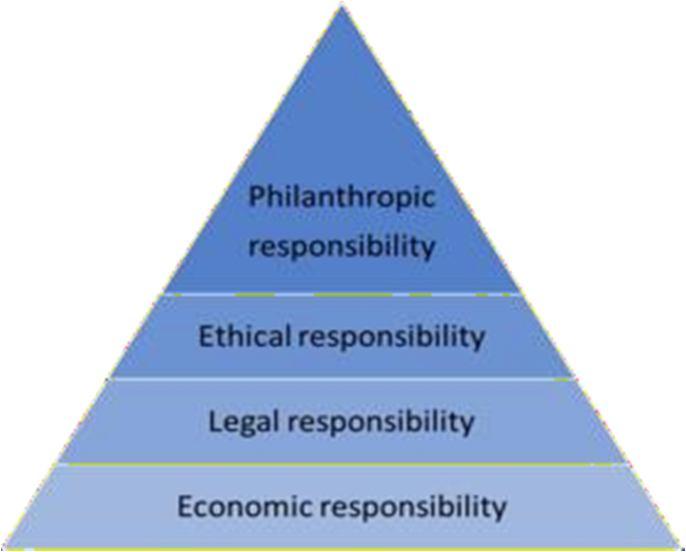

The economic responsibility of companies is about producing goods and services that society needs and to make a profit on them. Companies have shareholders who expect and demand a reasonable return on their investments, they have employees who want to do their jobs safely and fairly, and have customers that want quality products for fair prices. That’s the foundationof the pyramid upon which all the other layers rest.
Economic responsibility in CSR is:
1) The responsibilityto be profitable
2) The only way for a business to survive and support society in the long term
The legal responsibility of companies is about complying with the minimum rules that have been set. Organisations are expected to operate and function within thoserules. Thebasicrulesconsist oflawsandregulationsthatrepresent society’s views of codifiedethics. They determinehow organisations can conduct their business practices in a fair manner, as defined by legislators on national, regional, and local level.
Legal responsibility in CSR is:
1) Operating in a consistent way in accordance with government requirements and thelaw
2) Complying with different national and local regulations
3) Behaving as loyal state and companycitizens
4) Meeting legal obligations
5) Supplying goods and services that meet theminimum legal requirements
ISSN: 2321-9653; IC Value: 45.98; SJ Impact Factor: 7.538

Volume 10 Issue XII Dec 2022- Available at www.ijraset.com
The ethical responsibility of businesses goes beyond society’s normative expectations – laws and regulations. In addition, society expects organisations to conduct and manage their business in an ethical manner. Taking ethical responsibility means that organisations embraceactivities, standards, and practices that haven’t necessarily been written down, but are still expected. The difference between legal and ethical expectations can be difficult to determine. Obviously, laws are based on ethical premises, but ethics goes beyond that.
Ethical responsibility in CSR includes:
1) Performing in a way that’s consistent with society’s expectations
2) Recognisingandrespectingnewor evolvingethicalandmoral standardsthathavebeenadopted by society
3) Preventing ethical standards from being infringed upon to achieve objectives
4) Being proper business citizens by doing what’s ethically or morally expected
5) Acknowledging that business integrity and ethical behaviour go beyond compliancewith laws and regulations.
The philanthropic responsibility of businesses includes the voluntary or discretionary activities and practices of businesses. Philanthropy isn’t a literal responsibility, but nowadays business areexpected bysocietytotake part in such activities. Thenatureand quantity of these activitiesare voluntary and are guided by companies’ desire to take part in social activities that are generally not expected from organisations in an ethical sense. Businesses developing philanthropic or discretionary activities give the public the impression that the companywantsto give something back to the community.
In order to do so, businesses adopt different types of philanthropy, such as gifts, donations, volunteer work, community development, and all other discretionary contributions to the community or groups of stakeholders that make up that community.
1) Eradicating hunger, poverty and malnutrition
Promoting education
Promoting gender equality.
CSR initiatives related to the environment
Protection of nationalheritage, art and culture: 6) Measures can be taken towards thebenefit and support of armed forces veterans, warwidows and families. 7) Contributions to the Prime Minister’s National Relief Fund or any other fund set up bythe central government, for welfare, development and relief of the schedule caste, tribes, other backward classes, women and minorities.

A CSR policy improves company profitability and value. The introduction of energy efficiencies and waste recycling cuts operational costs and benefits the environment. CSR alsoincreases company accountability and its transparency with investment analysts andthemedia,shareholdersand local communities. This in turn enhances its reputation among investors suchas mutual funds that integrate CSR into their stock selection. The result is a virtuous circle where the company's stock value increases and its access to investment capital is eased.
2) Better Customer Relations Companies should be sociallyresponsible. Consumers are drawn to those companies thathave a reputation of being a good corporate citizen.
1) Conflicts with the Profit Motive Even for larger companies, the cost of CSR can be an obstacle. Some critics believe that corporate social responsibility can be an exercise in futility.
ISSN: 2321-9653; IC Value: 45.98; SJ Impact Factor: 7.538 Volume 10 Issue XII Dec 2022- Available at www.ijraset.com

A company's management has a fiduciary duty to its shareholders, and CSR directly opposes this, since the responsibility of executives to shareholders is to maximize profits. A manager who forsakes profits in favor of some benefits to society may expect to lose his job and be replaced by someone for whom profits are a priority.

2) Consumers are Wise to Greenwashing Greenwashing is term used to describe corporate practices that appear to be environmentally responsible without actually representing a change in how a company conducts its business. For example, a product may be labelled as "All Natural", even though it is being manufacturedjust as it always has. Some dry-cleaning services label their operations as "Organic" which sounds similar to "organic food" but really carries no specific meaning. Some customers may react positively to these types of claims, but othersare wary of corporate greenwashing.
A. To study the impact of CSR activities communicating about a brand.
B. To understand how CSR activities influences the purchase decision for a consumer.
C. To analyze the importance of CSR activities of a brand towards the society.
A. The study will help the market research analyst to understand the impact of CSR activities influencing the purchase decision of the consumers.
B. The study will help the market research analyst to understand which CSR activities is most favorable to the consumers.

C. The study will give a clear idea about the awareness of CSR activities from theperspective of the consumers.
The study was conducted through a google form where we have prepared a research questionnaire and we have sent the link of the google form to the various people in our contactsso that we can get the response. Respondents were from all around the world. Our questionnairewas designed in such a manner that wehavetaken all the age groups, gender into considerationand so their designation. We have asked 12 questions in the google form and we have got 75 respondents. Particularly questions were based on CSR activities and how it is impacting the consumer and their purchasing decision. We alsoreceived the data about theawareness of CSR activities and its importance from the consumer’s perspective.
This studyis based upon Primarydata where we have collected firsthand information throughthe google form. The type of research pattern which was carried out is Survey. https://docs.google.com/forms/d/1MWiIHuUhV- ACgUDHgu_diC223l9Rxr98REeGKs47te0/edit#responses

ISSN: 2321-9653; IC Value: 45.98; SJ Impact Factor: 7.538 Volume 10 Issue XII Dec 2022- Available at www.ijraset.com


Interpretation: Out of 75 respondents we received 74 respondents for the ager group. The maximum respondents belong to 1525 age group which consist of 86.5%. The age group of 26-35 consistof 9.5% followed by 46 & above age group which consist of 2.7% and last is the age group of36-45 which consist of 1.4%.

Interpretation: We received full response in this question where maximum respondents are females whichconsist of 50.7% and males consist of 49.3%.

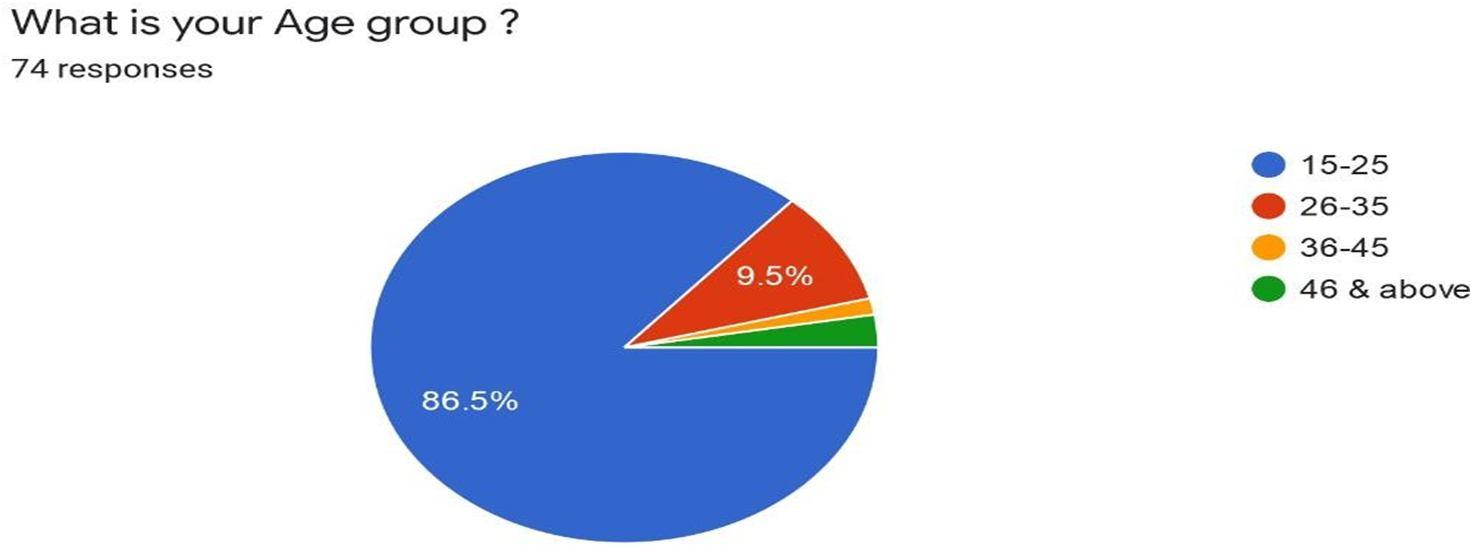
Interpretation: Out of 75 respondents we received 74 response. The maximum respondents of this question belong to ‘Student’ category which consist of 67.6% followed by ‘Employee’ category whichconsist of 18.9%. ‘Self-employed’ consist of 6.8%, ‘Housewife’ consists of 4.1% and last ‘Teacher’ consist of 2.1%.
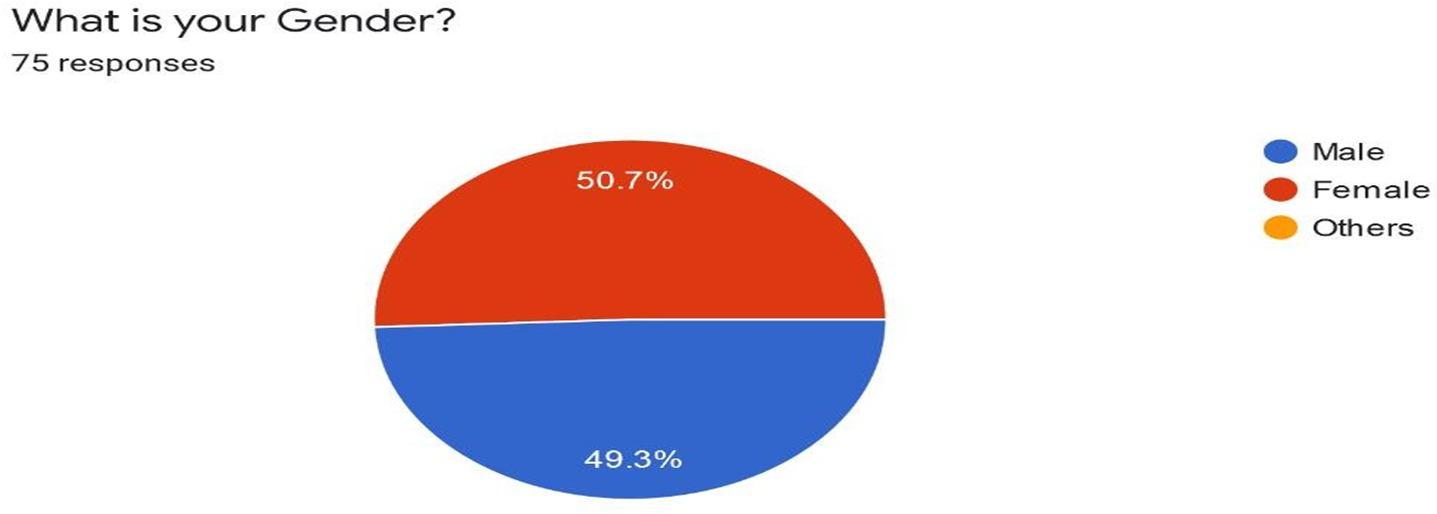
ISSN: 2321-9653; IC Value: 45.98; SJ Impact Factor: 7.538 Volume 10 Issue XII Dec 2022- Available at www.ijraset.com

Interpretation: We have received full response in this question where maximum people have voted Yes so wecan state that people aware about the CSR activities which consist of 52%. Around 36% of therespondents have voted No which means they are not aware about the CSR activities. There are few respondents who have voted for Maybe which consist of 12% that means they are skeptical about the awareness of CSR activities.
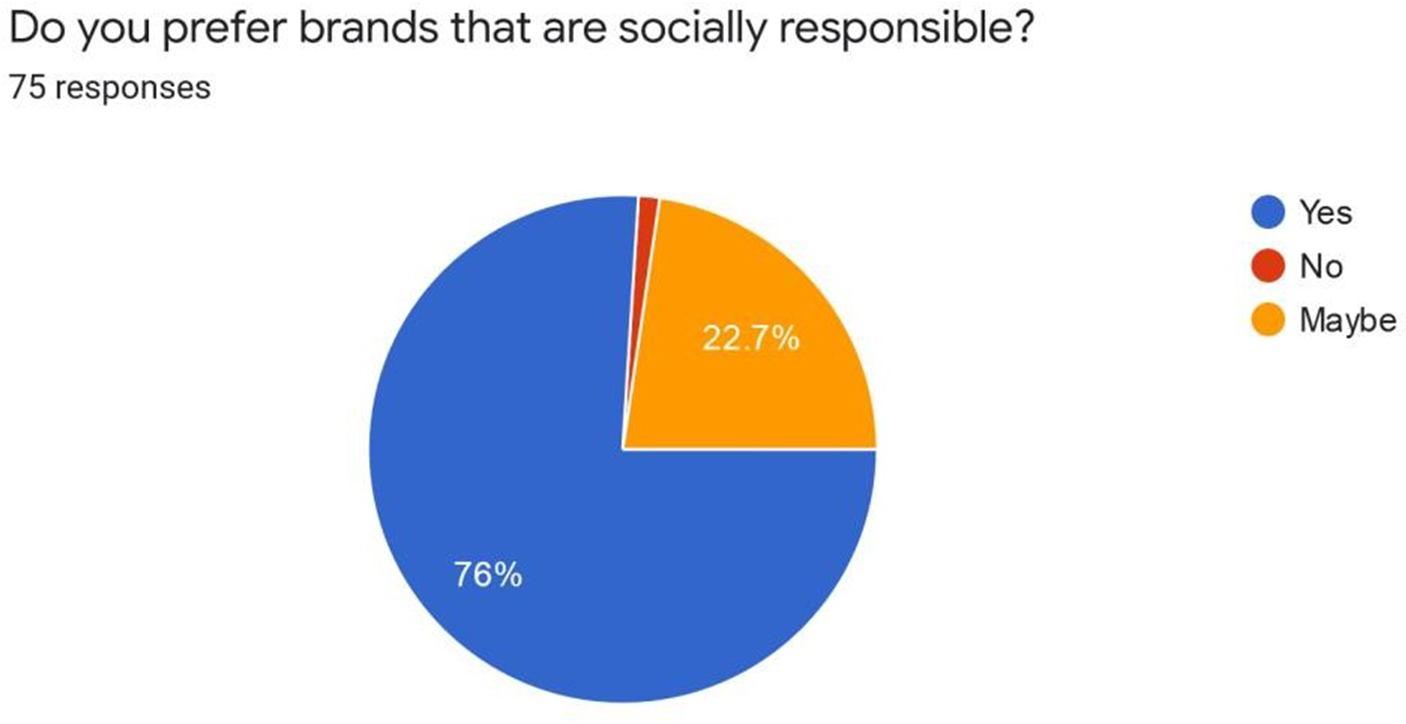

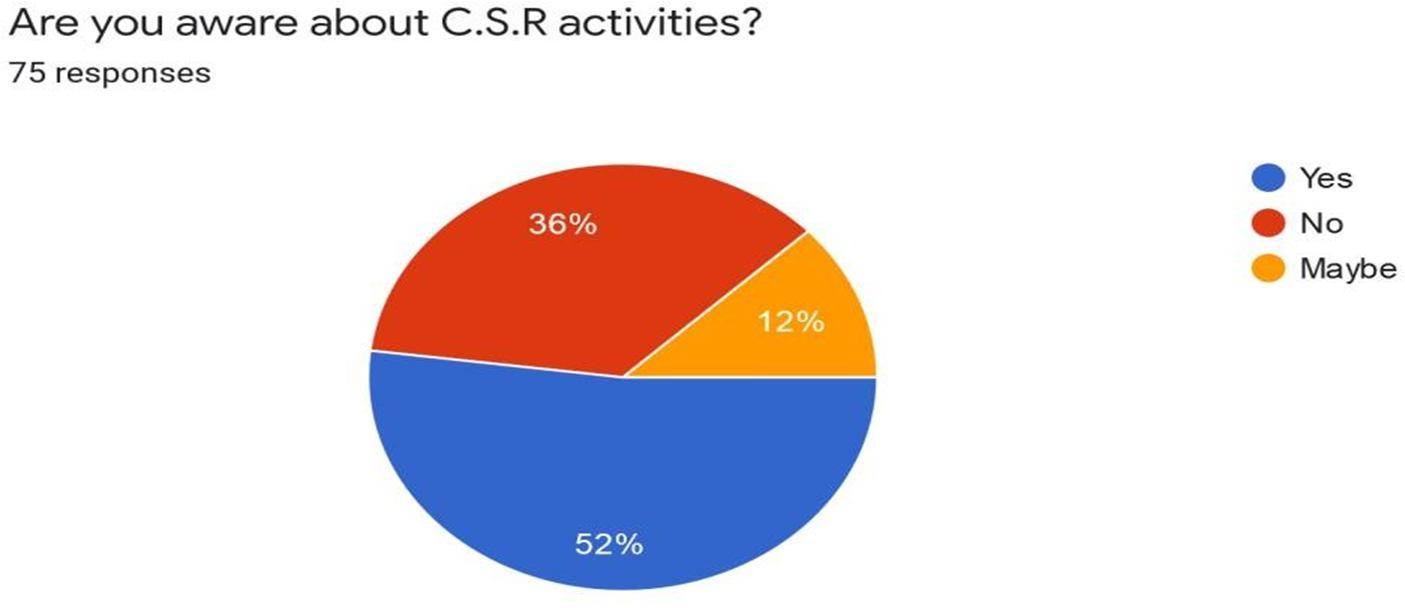
Interpretation: Wehavereceived full response where maximumrespondentshavevoted for Yes which consistof 76% so we can state that they prefer brands that are socially responsible. Around 22.7% of the respondents have voted for Maybe that means they are doubtful about the preference of their brandsthataresociallyresponsible. 1.3%ofthe respondentshavevoted for Nothat meansthey don’t prefer brands that are socially responsible.
Interpretation: We have received full response where maximum respondents have voted for ‘Google’ as theyare more familiar with the company which consist of 73.3% followed by ‘Netflix’ which consist of 36%. ‘Johnson & Johnson’ and ‘Coca-Cola’ consist of 34.7%. ‘The Walt Disney Company’ consist of 25.3% and the last we have ‘Ford Motor Company’ which consist of 20%.


ISSN: 2321-9653; IC Value: 45.98; SJ Impact Factor: 7.538 Volume 10 Issue XII Dec 2022- Available at www.ijraset.com

Interpretation: Out of 75 respondents we have received 54 response where maximum people have voted ‘No’which consist of 25.9%. as they are not aware about the other brands which are carrying out CSR activities. Tata and Wipro count around 5.6%, Nestle, ITC and Starbucks count around 3.7% and rest other brands like Infosys, JK Cement Ltd, Maruti Suzuki and Puma consists of 1.9

Interpretation: We have received full response where maximum respondents have voted for Yes so we can state that 62.7% of the respondents get influence to purchase products or avail services from such brands whereas 22.7% of the respondents have voted for Maybe that means they aren’t sure that they purchase the product and avail services under the influence of CSR activities. Around 14.7% of the respondents voted for No that means that CSR activities doesn’t influencethem to purchase or avail services from such brands.
Interpretation: Out of 75 respondents we have received 72 response. There were four practices mentioned out of which ‘Commitment to reducing environmental impacts’ has been voted highest by the respondents by 63.9% as it influences on their decision while purchasing from the brand. ‘Responsible selection and fairness towards suppliers and their employees’ has received 51.4%votes. ‘Fair treatment of customers’ consists of 43.1% and ‘Participation in charitable project’consist of 30.6%.



ISSN: 2321-9653; IC Value: 45.98; SJ Impact Factor: 7.538 Volume 10 Issue XII Dec 2022- Available at www.ijraset.com


Interpretation: Out of 75 respondents we received 66 response where 83.3% of the respondents has voted for‘Social events’ that means they have witnessed CSR activities mostly in social events. 34. 8%of the respondents witnessed CSR activities in ‘Colleges’. 21.2% of the respondents witnessedCSR activities in ‘Schools’ and 13.6% of the respondents witnessed CSR activities in ‘Parks’.

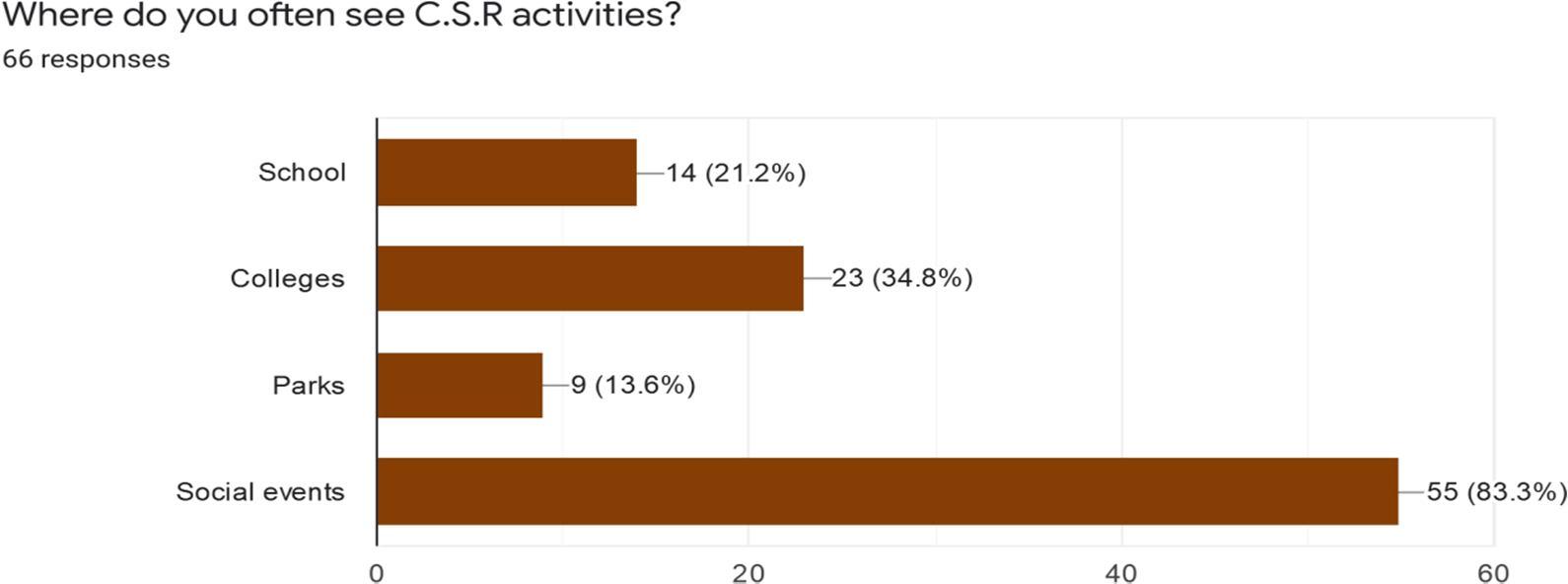
Interpretation: Out of 75 respondents we received 70 response where maximum respondents are skeptical about stopping to purchase the product or availing services from the brand which are not fulfillingtheir CSRactivitieswhich consistsof64.3% and 20% will stop purchasing or availingservices from the brand which are not fulfilling its CSR activities. 15. 7% of respondents will keep purchasingtheproducts or availingservicefrom thebrandwhicharenotfulfillingitsCSRactivities.
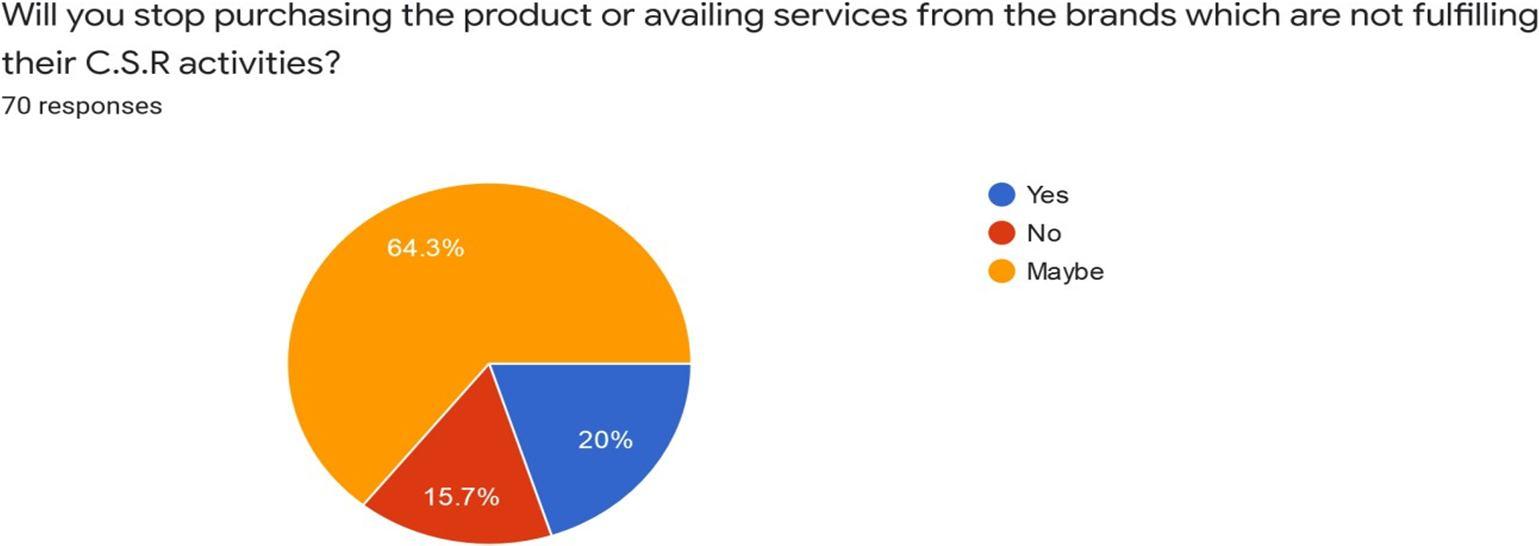
Interpretation: Out of 75 responses we received 71 responses where maximum respondents have rated the importance of CSR activities 5 as they find that conducting of CSR activities are important forthe brand towards the society which consists of 39.4% followed by 4 which count for 32.4% then 3 which count for 25.4% and last 2 count for 2.8%.


ISSN: 2321-9653; IC Value: 45.98; SJ Impact Factor: 7.538 Volume 10 Issue XII Dec 2022- Available at www.ijraset.com
A. 62% respondents prefer brands that are socially responsible
B. Commitment to environmental impact is the most influencing C.S.R activity thatinfluences the purchasing decision of an individual by 46%
C. 64.3% respondents are skeptical about purchasing from the brands which are notfulfilling C.S.R activities.
D. By 39.4% response we can conclude that conducting C.S.R activities has an impactfulover the brands in the society.
In thesurveywehaveseen thatmaximumrespondents werestudentsandtheyknewaboutCSRactivities happening around them. CSR activities has influenced on their purchasing decision and it plays an important role for the betterment of the society. Respondents were quite skeptical about stoppage of the products and services from the brand who are not fulfilling theCSR activities. They have experienced the CSR activities in the social events followed by colleges, schools and parks. Maximum respondents have rated 5 for the importance of CSR activitiesfor abrandtowardssocietywhich createsapositiveimpactinthesocietyasmaximumrespondents are aware about the CSR activities.
[1] https://bthechange.com/csr-in-india-is-now-a-law-2502aa6d0daa

[2] https://www.investopedia.com/terms/c/corp-social-responsibility.asp
[3] https://en.wikipedia.org/wiki/Corporate_social_responsibility https://www.toolshero.com/strategy/carroll-csr-pyramid/ https://www.avinashchandra.com/listof-csr-activities-in-india
[4] https://www.emerald.com/insight/content/doi/10.1108/EJM-01-2019-0088/full/html
[5] https://smallbusiness.chron.com/advantages-disadvantages-business-ethics-10414.html
[6] https://docs.google.com/forms/d/1MWiIHuUhV-ACgUDHgu_diC223l9Rxr98REeGKs47te0/edit#responses
